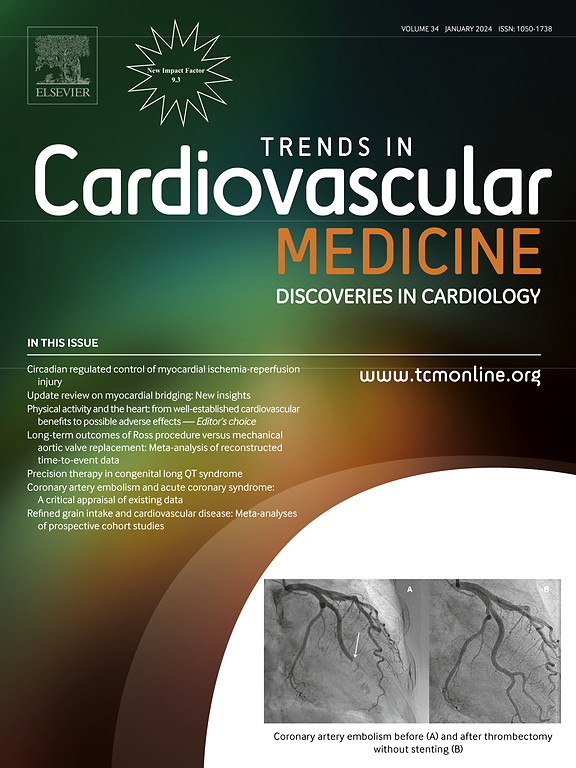Atrial fibrillation burden and management in cardiomyopathies: Current evidence and unmet needs
IF 9
2区 医学
Q1 CARDIAC & CARDIOVASCULAR SYSTEMS
引用次数: 0
Abstract
Atrial fibrillation (AF) is the most common sustained cardiac arrhythmia in patients with cardiomyopathies and its clinical management presents a significant challenge. The prevalence of AF varies among cardiomyopathies, with hypertrophic (HCM) and dilated cardiomyopathy (DCM) associated with higher rates of AF. Presence of AF portends increased risk for thromboembolism, heart failure, and cardiovascular morbidity and mortality in patients with cardiomyopathy. The complex genetic substrate in DCM and non-dilated left ventricular cardiomyopathy (NDLVC) contribute to the heterogeneity of AF burden and its sequelae among cardiomyopathy genotypes, necessitating genotype-tailored approach in AF screening and management. Given the lack of validation of traditional risk scores for AF in cardiomyopathies, current clinical recommendations emphasize the importance of comprehensive risk stratification for AF, monitoring for AF, and early initiation of oral anticoagulation for brief AF episodes in specific cardiomyopathy subtypes such as hypertrophic or amyloid cardiomyopathy. AF management includes antiarrhythmic drugs, interventional therapies such as catheter ablation, mitral valve replacement when necessary, and lifestyle modifications to attenuate AF burden and improve quality of life. This review summarizes the current knowledge on the clinical significance, prognostic implications, and treatment of AF among different cardiomyopathy subtypes. We underscore the paradigm shift in AF management advocating for an individualized, subtype-specific, and genotype-aware approach to AF in cardiomyopathies, which is instrumental in improving prognosis and patient-centric care.

心肌病患者的房颤负担和管理:现有证据和未满足的需求。
心房颤动(AF)是心肌病患者中最常见的持续性心律失常,其临床管理提出了重大挑战。房颤的患病率因心肌病而异,肥厚型(HCM)和扩张型心肌病(DCM)与房颤的发病率较高相关。房颤的存在预示着心肌病患者血栓栓塞、心力衰竭、心血管发病率和死亡率的增加。DCM和非扩张型左室心肌病(NDLVC)复杂的遗传底物导致房颤负担及其后遗症在心肌病基因型中的异质性,因此需要在房颤筛查和治疗中采用基因型定制的方法。鉴于缺乏对心肌病中房颤的传统风险评分的验证,目前的临床建议强调房颤的综合风险分层、房颤监测以及对特定心肌病亚型(如肥厚性或淀粉样性心肌病)的短暂房颤发作早期开始口服抗凝的重要性。房颤治疗包括抗心律失常药物、介入治疗(如导管消融、必要时二尖瓣置换术)和生活方式改变以减轻房颤负担和提高生活质量。本文综述了目前关于不同心肌病亚型心房颤动的临床意义、预后意义和治疗的知识。我们强调房颤管理模式的转变,提倡个体化、亚型特异性和基因型意识的方法来治疗心肌病房颤,这有助于改善预后和以患者为中心的护理。
本文章由计算机程序翻译,如有差异,请以英文原文为准。
求助全文
约1分钟内获得全文
求助全文
来源期刊

Trends in Cardiovascular Medicine
医学-心血管系统
CiteScore
18.70
自引率
2.20%
发文量
143
审稿时长
21 days
期刊介绍:
Trends in Cardiovascular Medicine delivers comprehensive, state-of-the-art reviews of scientific advancements in cardiovascular medicine, penned and scrutinized by internationally renowned experts. The articles provide authoritative insights into various topics, encompassing basic mechanisms, diagnosis, treatment, and prognosis of heart and blood vessel disorders, catering to clinicians and basic scientists alike. The journal covers a wide spectrum of cardiology, offering profound insights into aspects ranging from arrhythmias to vasculopathies.
 求助内容:
求助内容: 应助结果提醒方式:
应助结果提醒方式:


